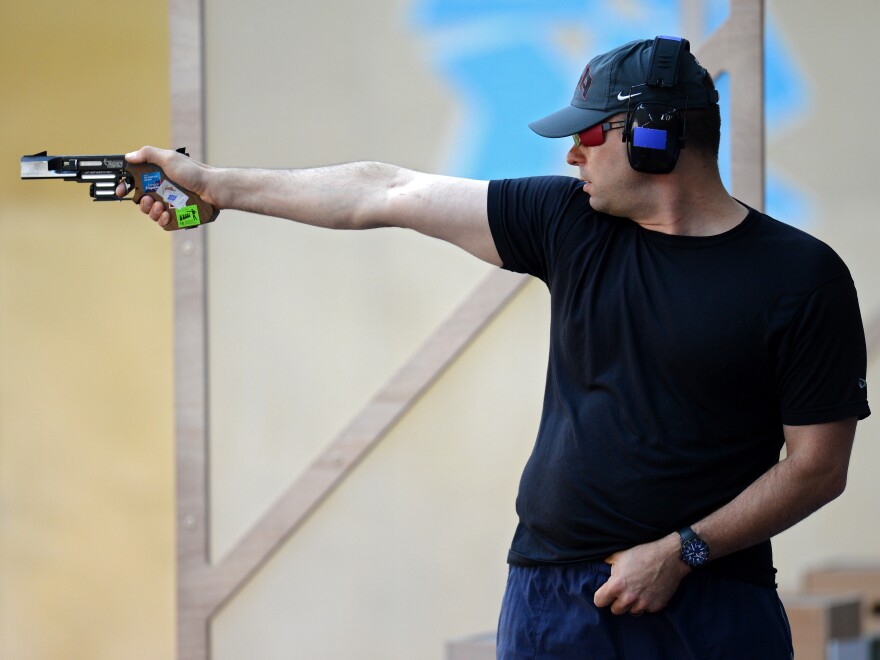Starting next month, Sarah Hirshland will officially take over as CEO of the U.S. Olympic Committee. One of the big issues she will have to deal with is ongoing sexual abuse scandals.
In recent months, athletes have come forward in sports like swimming, gymnastics, diving and taekwondo with allegations of sexual abuse or assault. Many athletes don't go public until years after the alleged assaults take place. They stay silent in part because of the taboo around sexual abuse. In some cases, young people can't identify what has happened to them as a crime.
But a major reason athletes stay silent is fear that publicly criticizing sport governing organizations could derail their athletic career.
Keith Sanderson, a three-time Olympian in shooting, made that point in an interview with KOAA television in Colorado Springs last February. The interview came just a few weeks after more than 100 girls and women testified in a Michigan courtroom about how the former USA Gymnastics team doctor, Larry Nassar, had abused them.
In the KOAA interview, Sanderson pointed out that there is one route to the Olympics, and that is through the U.S. Olympic Committee. "There's no competition there," he said. "They have a total monopoly on who the Olympians are." To voice public criticism could potentially jeopardize their standing in their sport.
Shortly after giving the interview, Sanderson says he himself experienced retaliation: he discovered that his ID allowing access to the U.S. Olympic training center no longer worked. "The guard ran over to me and said, 'Hey you need to leave, I'm sorry, you're not allowed on the Olympic training center,'" he told NPR. He says he found out later his photograph had been put on flyers in the facility, describing him as a danger to the community.
Sanderson then discovered he had been suspended from the national team and that he was no longer a member of USA Shooting. While he was reinstated roughly two weeks later, he believes the lockout and suspension were retaliatory measures that were a message to other athletes who might publicly take the Olympic governing body to task.
A spokeswoman for USA Shooting says that Sanderson's criticism had nothing to do with why he was temporarily blocked from the training center. She says there are allegations against him that will be worked out in mediation.
Last March, after Sanderson was booted from the training center, triathlete Steve Sexton, wrote an in the Wall Street Journal. In it, he described how he had been retaliated against after he lobbied for reforms to the USOC. "I was removed in 2016 from my role as an elected athlete representative at USA Triathlon after I lobbied congressional staff for reforms to the USOC." he wrote, adding, "A growing chorus of past Olympians is calling for reform."

Jon Little, an attorney who has represented multiple athletes who have brought cases against the U.S. Olympic Committee and sports governing bodies like USA Swimming and USA Taekwondo, says one client just recently decided against pursuing a case after being sexually molested by her trainer in an Olympic sport.
"She was told by her coach that he couldn't have any contact with her because she might file a legal claim," Little says. He says she decided against pursuing a case because she believed it would eliminate any chance she had of competing in the 2020 Olympics.
It's not just athletes who feel they were frozen out after speaking up. Mike Saltzstein was a vice president of USA Swimming from 2000-2006 and served as a technical official at the 2008 Beijing Olympics. He says that after he criticized USA Swimming for what he believed to be inadequate policies to prevent sexual abuse in 2010, the organization never gave him opportunities like the position he held at the Olympics again.
It left a void. "I had given this organization 30 years of my life," Saltzstein says. "And all of the sudden there was a hole in my life."
That sense of connection to a sport and its community can be even stronger for young athletes. As Lawrence Chalip, a professor of sports policy at the University of Illinois puts it, "you simply don't want to risk things because you have so much invested." That is particularly true, he says, when athletes and their parents harbor Olympic dreams: "The five rings are a drug. They are a narcotic."
A spokesman for the U.S. Olympic Committee, Mark Jones, points out thousands of athletes have participated in the Olympic movement and he claims there are always some who feel they have been mistreated.
When it comes to young athletes who have been sexually abused, Jones says the USOC understands they might be scared to report. That's a major reason the committee launched an independent organization last year to conduct investigations.
"The founding and the funding for the U.S. Center for SafeSport," Jones says, "was a critical moment in our collective effort to keep kids safe."
As he points out, reports can be made to the center anonymously. And athletes are reaching out. The center has been open for a year and a half and in that time, it's received more than 1,000 reports of abuse.
Copyright 2024 NPR


